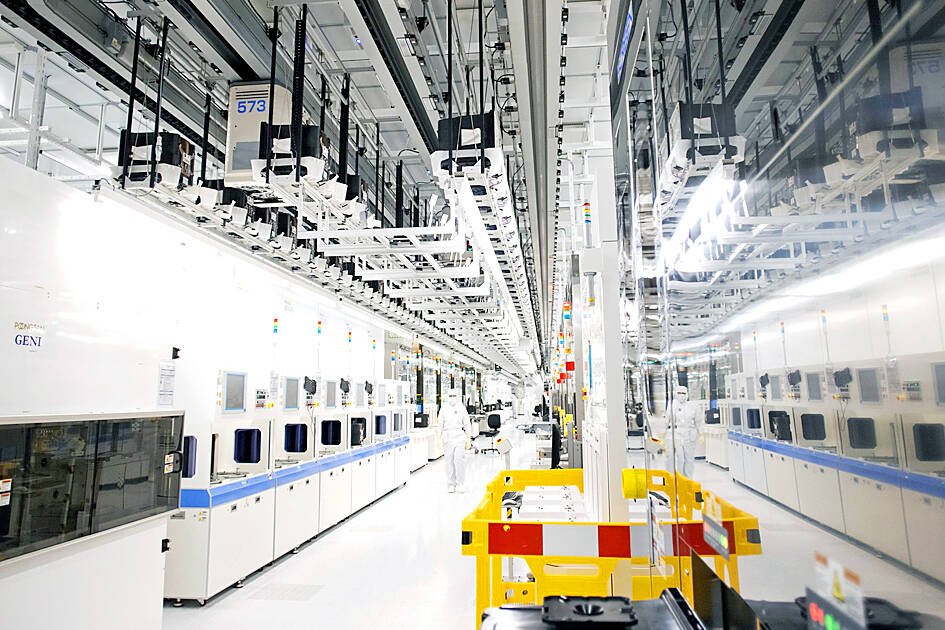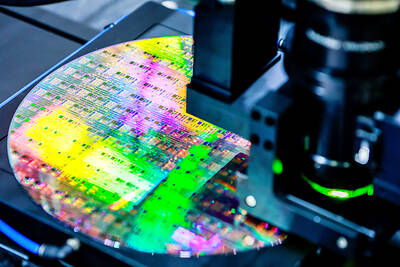General Motors Co (GM) signed a deal with GlobalFoundries Inc to lock up production capacity for semiconductors, helping the automaker manage a chip shortage that has hindered auto production for several years.
GlobalFoundries, a provider of made-to-order semiconductors, is to set aside capacity at its New York plant exclusively for chips destined for GM vehicles.
The automaker is planning to tell its chip design suppliers to use the company’s production to make some of the components it deems essential to its vehicles.

Photo: Bloomberg
“We see our semiconductor requirements more than doubling over the next several years as vehicles become technology platforms,” GM executive vice president of global product development, purchasing and supply chain Doug Parks said in a statement on Thursday.
GM has been reducing the number of unique chips needed to build increasingly complex vehicles.
‘RESILIENCE’

Photo: Bloomberg
Parks said the GlobalFoundries deal “will help establish a strong, resilient supply of critical technology.”
GlobalFoundries is positioning itself to take advantage of attempts to remake the semiconductor supply chain.
Governments in the US and Europe are pushing through support packages aimed at increasing local manufacturing of the devices and lessening a dependence on East Asia.
Outlining plans to increase his company’s footprint in the US, GlobalFoundries CEO Tom Caulfield has said he would put capacity in place when his customers commit to using it.
LESS ADVANCED CHIPS
Unlike Intel Corp and Micron Technology Inc, GlobalFoundries is concentrating its efforts on older types of chip manufacturing that it says would stay in high demand for years.
Electronic components in vehicles are not typically made on the most advanced chipmaking gear, but a dearth of investment in that type of production has made capacity tight.
Caulfield said his company is “committed to working with our customers in new and innovative ways to best address the challenges of today’s global supply chains.”

TECH TITAN: Pandemic-era demand for semiconductors turbocharged the nation’s GDP per capita to surpass South Korea’s, but it still remains half that of Singapore Taiwan is set to surpass South Korea this year in terms of wealth for the first time in more than two decades, marking a shift in Asia’s economic ranks made possible by the ascent of Taiwan Semiconductor Manufacturing Co (TSMC, 台積電). According to the latest forecasts released on Thursday by the central bank, Taiwan’s GDP is expected to expand 4.55 percent this year, a further upward revision from the 4.45 percent estimate made by the statistics bureau last month. The growth trajectory puts Taiwan on track to exceed South Korea’s GDP per capita — a key measure of living standards — a

Samsung Electronics Co shares jumped 4.47 percent yesterday after reports it has won approval from Nvidia Corp for the use of advanced high-bandwidth memory (HBM) chips, which marks a breakthrough for the South Korean technology leader. The stock closed at 83,500 won in Seoul, the highest since July 31 last year. Yesterday’s gain comes after local media, including the Korea Economic Daily, reported that Samsung’s 12-layer HBM3E product recently passed Nvidia’s qualification tests. That clears the components for use in the artificial intelligence (AI) accelerators essential to the training of AI models from ChatGPT to DeepSeek (深度求索), and finally allows Samsung

Taiwan has imposed restrictions on the export of chips to South Africa over national security concerns, taking the unusual step of using its dominance of chip markets to pressure a country that is closely allied with China. Taiwan requires preapproval for the bulk of chips sold to the African nation, the International Trade Administration said in a statement. The decision emerged after Pretoria tried to downgrade Taipei’s representative office and force its move to Johannesburg from Pretoria, the Ministry of Foreign Affairs has said. The move reflects Taiwan’s economic clout and a growing frustration with getting sidelined by Beijing in the diplomatic community. Taiwan

READY TO HELP: Should TSMC require assistance, the government would fully cooperate in helping to speed up the establishment of the Chiayi plant, an official said Taiwan Semiconductor Manufacturing Co (TSMC, 台積電) yesterday said its investment plans in Taiwan are “unchanged” amid speculation that the chipmaker might have suspended construction work on its second chip packaging plant in Chiayi County and plans to move equipment arranged for the plant to the US. The Chinese-language Economic Daily News reported earlier yesterday that TSMC had halted the construction of the chip packaging plant, which was scheduled to be completed next year and begin mass production in 2028. TSMC did not directly address whether construction of the plant had halted, but said its investment plans in Taiwan remain “unchanged.” The chipmaker started